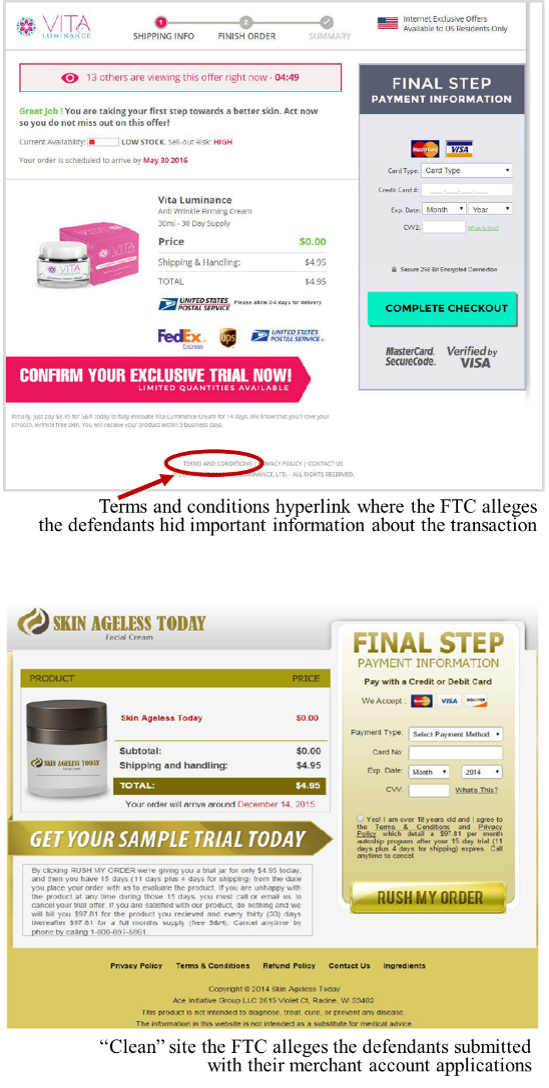From the FTC’s perspective, a certain pattern of online business has become a recipe for consumer injury.
- Start with a misleading “risk-free” trial offer.
- Add a hefty undisclosed charge if consumers don’t quickly cancel the “risk-free” trial.
- Cook up an undisclosed automatic shipment program that sends consumers unordered merchandise.
- Top with hard-to-follow upsells that add another layer of confusion.
- Fold in illegal charges to consumers’ credit or debit cards.
- Freeze out people who try to stop the unauthorized shipments and charges.
- Cover with straw owners to hide the defendants’ activities.
It’s an unappetizing entrée that leaves consumers queasy. And it’s a marketing scheme the FTC has challenged yet again – this time in a lawsuit against Puerto Rico-based Gopalkrishna Pai and eight companies he owns, alleging violations of the Restore Online Shoppers' Confidence Act (ROSCA).
The main ingredients in this case were online “risk-free” trials of skin care products sold in pairs – Vita Luminance and Regenelift, Derma Vibrance and Nuevoderm, Revived Youth Cream and Revived Youth Serum, and Aura Youth Cream and Aura Youth Serum. According to the FTC, the check-out pages led consumers to believe their credit cards would be billed just for a $4.95 shipping and handling fee. Below the large turquoise COMPLETE CHECKOUT button were two small line of grey type that said “Initially, just pay $4.95 for S&H today to fully evaluate Vita Luminance Cream for fourteen (14) days. We know that you’ll love your smooth, wrinkle free skin. You will receive your product within 5 business days.”
 But there was something buried even below the already hard-to-read fine print: a tiny “terms and conditions” hyperlink. Only by clicking on that obscure link would consumers learn that at the end of the 14- or 15-day trial period, the defendants would charge them the full price of the product – $90 or more – and enroll them in an auto-ship program with recurring charges until they cancelled.
But there was something buried even below the already hard-to-read fine print: a tiny “terms and conditions” hyperlink. Only by clicking on that obscure link would consumers learn that at the end of the 14- or 15-day trial period, the defendants would charge them the full price of the product – $90 or more – and enroll them in an auto-ship program with recurring charges until they cancelled.
The FTC says the illegality didn’t end there. The defendants supersized the misleading deal during the check-out process by claiming to offer another “risk-free” trial of a second product that promised to “maximize your results” for another $4.95 shipping payment. But according to the FTC, that second offer came with the same strings attached, the same unauthorized credit card charges, and yet another undisclosed auto-ship program.
The defendants said on their websites that consumers could cancel anytime by phone or email, but the FTC says that claim, too, was poco fiable – not reliable. In fact, many of the customer service reps consumers reached spoke only Spanish and the recorded messages on some of the defendants’ phones were only in Spanish. Even if consumers were able to speak with an operator, the FTC says people often received only a partial refund or no refund at all and in many instances the onslaught of unordered merchandise continued.
The complaint also alleges that, to get the merchant accounts he needed to process credit and debit card sales, defendant Pai used more than 100 phony names in an effort to camouflage his operation from payment processing entities and banks. One favorite trick: falsifying employer identification numbers to hide the fact that he was behind all of the accounts. According to the lawsuit, “By doing so, Pai shielded himself from consumer complaints and chargeback disputes related to sales processed through his LLCs’ merchant accounts, thereby evading detection from consumers, financial institutions, and law enforcement.”
That wasn’t his only attempt to hoodwink the payment system. According to the complaint, Pai had “clean” sites he showed just to merchant processors – sites that differed markedly from the sites consumers saw. The FTC says those sites were there just for show and didn’t result in product sales.
Filed in federal court in Puerto Rico, the complaint alleges multiple ROSCA violations.
By now, online marketers should be aware of the requirements of ROSCA. The law bans online negative options unless the seller: 1) clearly discloses all material terms of the deal before obtaining a consumer’s billing information; 2) gets the consumer’s express informed consent before making the charge; and 3) provides a simple mechanism for stopping recurring charges. Another thing marketers should know about ROSCA: the FTC’s continued commitment to challenge violations.

In reply to You should add and by Nelly Mitford
To report a problem to the FTC, go to www.FTC.gov/Complaint. The information you give will go into a secure database that the FTC and other law enforcement agencies use for investigations.
The comments you put here on the blog don't go into the law enforcement database.